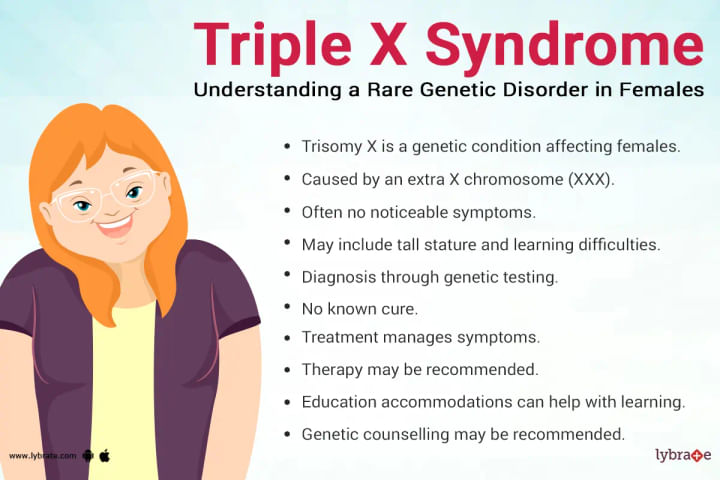Triple X syndrome: What is it and how is it treated?
What do you know about 'triple X syndrome'?
Triple X syndrome, which may also be referred to as trisomy X, is a genetic condition that mainly affects females and is caused by the presence of an extra X chromosome. Typically, females have two X chromosomes, but in this disorder, there are three X chromosomes instead of two, leading to an overabundance of genetic material.
The exact cause of this extra X chromosome is not well known or understood, but it is believed to be a random event that occurs during the formation of the egg or sperm cells. It is not the result of any specific environmental factor or behavior of the parents.
There are two main forms of triple X syndrome: mosaic and non-mosaic. Mosaic occurs when only some of a person's cells have the extra X chromosome, whereas non-mosaic occurs when all of a person's cells have the extra X chromosome.
What are its signs and symptoms?
The manifestation (or signs and symptoms) of triple X syndrome varies widely among individuals and can be either mild or severe. Common symptoms include tall stature, weak muscle tone, and delays in reaching developmental milestones such as crawling, walking, and talking.
Other physical characteristics that may be present include a small head, a flat face, droopy eyelids, and a high-arched palate. Some individuals with triple X syndrome may also have difficulty with coordination and balance.
Intellectually, individuals with triple X syndrome may experience learning difficulties and may have a lower IQ compared to those without the condition. However, many individuals with triple X syndrome have normal intellectual development and go on to lead productive lives.
What are the causes of this condition?
Triple X syndrome is caused by the presence of an additional X chromosome in female cells. Normally, females have two X chromosomes (one from each parent), but in triple X syndrome, there is a third X chromosome, leading to extra genetic material.
The cause of this extra X chromosome is not well understood, but it is believed to occur randomly as the egg or sperm cells form. It is said not to be caused by any particular environmental factor or due to any behavior or action of the parents.
There are two main types of triple X syndrome: mosaic and non-mosaic. mosaic occurs when only some of a person's cells have the extra X chromosome, whereas non-mosaic occurs when all of a person's cells have the extra X chromosome.
Triple X syndrome, in a nutshell, stems from the presence of an extra X chromosome in a female's cells. It is believed to occur randomly and is not caused by any specific environmental factor or behavior of the parents. There are two main types of triple X syndrome: mosaic and non-mosaic.
What are the risks associated with triple X syndrome?
In terms of medical concerns, women with triple X syndrome have a higher risk of developing certain health problems, including bladder control issues, infertility, and cardiovascular disease. Moreover, they may have an increased susceptibility to anxiety, depression, or other mental health issues like those.
Some other health risks or complications associated with triple X syndrome may include:
- Delays in physical and intellectual development: Individuals with triple X syndrome may experience delays in reaching developmental milestones such as crawling, walking, and talking. They may also have a lower IQ compared to individuals not affected by the condition.
- Weak muscle tone: Weak muscle tone is a common issue for individuals with triple X syndrome and can lead to difficulty with coordination and balance.
- Bladder control problems: Women with triple X syndrome may be more susceptible to bladder control issues.
- Infertility: Infertility is a common issue among women with triple X syndrome.
- Cardiovascular disease: Women with triple X syndrome may be more susceptible to developing cardiovascular disease.
- Mental health concerns: Anxiety, hypertension, depression, and other mental health problems are more common among individuals with triple X syndrome. It is important for individuals with triple X syndrome to receive regular medical care and monitoring to help manage any health problems and to receive the support they need to live healthy and productive lives. While triple X syndrome can be associated with several health risks, with proper medical care and support, affected individuals can lead fulfilling lives.
How is it diagnosed?
Triple X can be diagnosed through various medical procedures. These include:
- Prenatal testing: Prenatal diagnosis of triple X syndrome can be achieved through tests like chorionic villus sampling (CVS) or amniocentesis during pregnancy. These procedures involve removing a sample of the placenta or amniotic fluid to test for genetic abnormalities.
- Cytogenetic analysis: This test examines an individual's chromosomes to look for any genetic abnormalities.
- Fluorescence in situ hybridization (FISH): FISH is a test that uses fluorescent probes to detect the presence of specific genes or chromosomes. This test is commonly used to diagnose triple X syndrome.
- Chromosomal microarray analysis (CMA): This test uses a computer to analyze a person's DNA to detect any genetic abnormalities.
- Karyotyping: Karyotyping is a test that creates a picture of an individual's chromosomes to look for any genetic abnormalities.
It is important to note that these tests are not always 100% accurate and may not detect all cases of triple X syndrome.Thus, seeking a medical evaluation is crucial to determining the optimal approach to deal with this condition.
All in all, triple X syndrome can be diagnosed through various medical procedures, including prenatal testing, cytogenetic analysis, FISH, CMA, and karyotyping. A doctor should be consulted for a complete evaluation to determine the best course of action.
What is the cure for this condition?
Unfortunately, there is currently no cure for triple X syndrome, also known as trisomy X. This is a genetic condition that affects individuals for their entire lives. However, with proper medical care and support, individuals with triple X syndrome can lead healthy and fulfilling lives.
The management of triple X syndrome focuses on addressing the various symptoms and health risks associated with the condition. This may include physical therapy to help with weak muscle tone and coordination, speech therapy to address any speech delays, and counseling to address any mental health concerns.
It is important for individuals with triple X syndrome to receive regular medical care and monitoring to help manage any health problems and to receive the support they need to live healthy and productive lives. This may involve seeing a specialist, such as a geneticist, endocrinologist, or psychologist, to address specific health concerns.
On the whole, while there is no cure for triple X syndrome, with proper medical care and support, affected individuals can lead fulfilling lives. It is important for individuals with triple X syndrome to receive regular medical care and monitoring to help manage any health problems and to receive the support they need to live healthy and productive lives.
Conclusion:
Triple X syndrome is a genetic disorder primarily affecting females, characterized by the presence of an additional X chromosome. The symptoms and health problems associated with the condition can vary greatly, but with proper medical care and support, individuals with triple X syndrome can lead fulfilling lives.
It is important for women with triple X syndrome to receive regular medical care and monitoring to help manage any health problems and to receive the support they need to live healthy and productive lives. Additionally, we hope this article was informative and answered all your questions about triple X syndrome. That said, if you have further questions, don't hesitate to reach out.



+1.svg)
